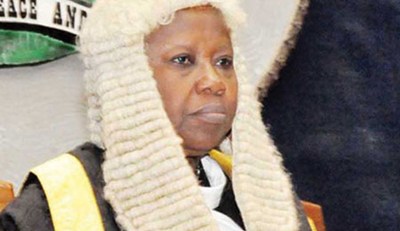
October 30, 2014
/
By:
ofcounsel_admin/
- 0 Comments
/
- Law News
THE Nigerian judiciary by its very nature is the most reserved organ of the Federal government.
Most of its secrets and scandals are meticulously swept under the spacious carpets of history.
Unlike what obtain in both the Executive and Legislative arms of governance in the country, the judiciary, has a peculiar way of shielding the skeletons behind the veils of the temple of justice, from the ever probing glare of the public.
This was exemplified in the way the scandal that trailed the action of an erstwhile Chief Justice of Nigeria who attempted to turn the Constitution upside down by unilaterally elevating a sitting President of the Court of Appeal, PCA, to the Supreme Court bench, was smoothly buried in the dust of history.
Till date, nothing happened in the issue involving former CJN, Justice Aloysius Katsina-Alu, who the erstwhile PCA, Justice Ayo Salami, accused of handing him a “Greek gift”, in total disregard to the Constitution of the Federal Republic of Nigeria
Yes- like always, the National Judicial Council, NJC, always has one or two things to say with a view to persuading Nigerians to look the other way- after all, something is being done!
However, this time around, it seems the war is brewing within the “house” itself- as even a member of the NJC is threatening to go to court in a bid to ensure that the law is strictly obeyed by those who are supposed to ensure that the law is obeyed.
This move has further highlighted the level of hypocrisy within the judiciary.
Was it a mere happenstance or what, that a former President of the Nigerian Bar Association, Mr. Joseph Daudu, SAN, chose to open the can of worms just few weeks to the retirement of the incumbent CJN, Justice Mariam Aloma Muhktar.
Right from when she took over the mantle of leadership in the judiciary, Justice Muhktar, being the first female CJN in the annals of the country, vowed to tackle corruption, laxity and indiscipline both within the Bar and the Bench, headlong.
Upon July 16 when she took over from ex-CJN, Justice Dahiru Mustapha In line with the express provisions of section 291(1) of the 1999 Constitution, as amended, Justice Muhktar, warned all the indolent judges to sit up.
Nobody actually took her serious until two judges got the boot followed by suspension of Justice Abubakar Thalba of the Abuja High Court who was suspended for one year for giving a slap-on-the-wrist sentence to an acclaimed pension thief.
Subsequently, she introduced a monthly assessment programme that helps to monitor the work rate and actions of judges across the federation.
However, it has emerged that the CJN, in her burning bid to achieve results in a field that was hitherto dominated by men since the inception of the country, probably stepped on certain provisions of the 1999 Constitution.
Overbearing headmistress
In a recent press briefing he held in Abuja, the former NBA President, Daudu, SAN, accused the CJN who is due to retire on November 20, of conducting the functions of her office like an overbearing headmistress.
Daudu specifically accused the outgoing CJN of treating Judges like kindergarten children.
He further vowed to go to court with a view to ensuring that the constitutional misnomers that were committed by the outgoing CJN are not repeated.
Daudu who is the Chairman of the Rule of Law Foundation, maintained that a repetition of such illegal acts by the CJN would not only portend bad for the country, but adversely affect the administration of justice.
According to him, “An independent judiciary must not only be independent of external and internal influences, but also it must be seen to be impartial. It is necessary to address this issue as the leadership of the Nigerian Judiciary is in a transitory state, with the incumbent retiring on or about the 20th of November, 2014.
“The tenure of Justice Mariam Aloma Muhktar has witnessed commendable strides in the fight against corruption within the system. For that we commend her. But there have in the process of this battle against corruption been certain actions that are clearly and unmistakably unconstitutional and which if left unchecked will destroy the entire foundation on which the independence of the judiciary is erected.
“It is common knowledge that before the emergence of the present leadership, some judges were wont to be truant, leaving their jurisdictions without permission and thereby affecting output or productivity in a very negative manner. To arrest this debilitating trend, the outgoing CJN had issued directives requiring all Justices and Judges of all courts (Federal and States) to seek her approval before travelling outside the country for any reason.
“So judicial officers had to seek approval from the CJN through their Heads of Courts before travelling for medical or personal reasons.
“In a number of cases, the CJN has refused permission for a judge e.g. in the Federal High Court despite positive recommendation from the head of that court. Of late, this situation has degenerated to the point where Heads of Courts, Justices of the Court of Appeal and State High Court Judges have been queried by the office of the CJN because they were sighted at conferences in which the Chief Justice was herself attending.
Disciplinary action
“It must be stated that a query to a judicial officer is the commencement of disciplinary action. The Chief Justice has no power to initiate disciplinary action except in accordance with the Code of Conduct and Rules for the discipline of judicial officers, which stipulates that such process cannot commence without a petition received from a person complaining against the conduct of a judicial officer.
“Where the CJN issues a query in the circumstances referred to above, it is a needless dent on the record of the officer. It also has a direct negative bearing on the independence and impartiality of that judicial officer especially where for one reason or the other there have been historical or other issues between the latter and the former.
“However the real issue here is whether the Chief Justice of Nigeria possesses any constitutional or statutory power to interfere in the administration of other courts set up by the Constitution of the Federal Republic of Nigeria. In reality, should any judge of a State Court, the Court of Appeal, the Federal High Court or National Industrial Court of Nigeria go beyond their Head of Court for approval on administrative issues such as the movement of that Judge or a Justice?
Titular head
“The Foundation notes that no provision of the Constitution or the Supreme Court Act or any other statute provides for functions and duties of the CJN. Item 20 of the 3rd schedule only makes the CJN the Chairman of the National Judicial Council. By that office, the Chairman of the NJC is not the titular head of all the courts in Nigeria.
The powers of the NJC are set out in item 21 of the 3rd schedule of the 1999 Constitution and none of the items therein vests the CJN with powers to interfere in the administration of any court in Nigeria apart from the Supreme Court of Nigeria. This foundation emphatically and categorically states that the CJN is only the head of the Supreme Court of Nigeria.
“By the principles of federalism entrenched in our Constitution, it is anathema (forbidden) for the CJN to wish to control the administration of Federal and State Courts. That Function is left to the Chief Ju dges of the Judiciaries of those States and the Heads of the other federal courts such as the President of the Court of Appeal, the CJ of the Federal High Court and the President of the National Industrial Court of Nigeria.
“Where those Heads of Courts find it difficult to curb the conduct or misbehavior of any judicial officer under their charge, it is their duty to bring it to the attention of the NJC not the CJN such conduct or misconduct. Where the latter initiates a query directly even under the imprimatur of the NJC, he becomes a judge in his own cause and aside from the unconstitutionality of the entire process it is an unjustified intrusion into the constitutional functions of these courts.
“It is indeed a matter of great surprise and shock that some Heads of State Courts and indeed other courts were seeking permission from the office of the CJN before travelling. While the foundation agrees that there needs to be discipline in the system as it relates to the movement of judicial officers, such discipline must not be at the expense of the Rule of Law and independence of the judiciary where Judges can be subjected to witch-hunt on account of other reasons unconnected with their movement.
“The Foundation is of the considered view that the practice or convention that obtained during the excellent tenure of his Lordship the Hon. Uwais CJN, which was that Heads of Court merely notified the office of the CJN as Chairman of the NJC remains the best method of monitoring the movement of judicial officers.
“It is for the head of court to give permission and the CJN to be appropriately notified. To operate in the current manner is to reduce Nigerian Judicial Officers to kindergarten children under the supervision of an overbearing headmaster.
“If this approach is left unchecked, it might lead us to the situation where in the not too distant past, a former CJN, in the exaggerated belief in the powers of his office sought to ‘promote’ the then President of the Court of Appeal to the Supreme Court as a way of removing him from office.
“We resisted the subterfuge and brazen unconstitutionality. We must continue to resist the expansion of the powers of the CJN at the expense of constitutionalism and due process of the law. The Foundation will not hesitate to file public interest litigation for a judicial ascertainment of what has been stated above if this interference with the independence of the judiciary continues”, he added.
Independence of the judiciary
Even though the ex-NBA boss has raised germane issues worthy of consideration, Nigerians would wonder why he specially chose to come forward with the observations at this period when the CJN’s tenure is about to expire.
Could he be dancing to a special tune by a special people that chose to elect someone to cry louder than the bereaved?
Will the CJN just fold her hands and allow her tenure to end with the issues raised against her tucked inside the cupboard where the dirty laundry of her predecessors were also laid to perpetual rest? Posterity will certainly be the ultimate judge.



